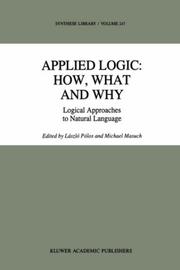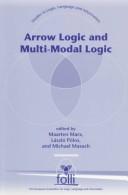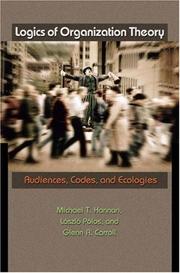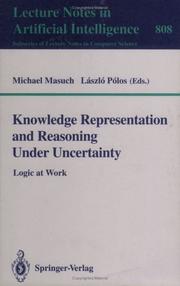| Listing 1 - 6 of 6 |
Sort by
|

ISBN: 0792334329 9048145368 9401585334 9780792334323 Year: 1995 Volume: 247 Publisher: Dordrecht : Kluwer,
Abstract | Keywords | Export | Availability | Bookmark
 Loading...
Loading...Choose an application
- Reference Manager
- EndNote
- RefWorks (Direct export to RefWorks)
Article
Abstract | Keywords | Export | Availability | Bookmark
 Loading...
Loading...Choose an application
- Reference Manager
- EndNote
- RefWorks (Direct export to RefWorks)

ISBN: 1575860252 1575860244 9781575860244 Year: 1996 Publisher: Stanford : Centre for the Study of Language and Information (CSLI),
Abstract | Keywords | Export | Availability | Bookmark
 Loading...
Loading...Choose an application
- Reference Manager
- EndNote
- RefWorks (Direct export to RefWorks)
Logic. --- Modality (Logic) --- Logique --- Modalité (Logique) --- Modality (Logic). --- Modalité (Logique)
Book
ISBN: 1283379929 9786613379924 1400843014 9781400843015 9781283379922 Year: 2007 Publisher: Princeton, N.J. : Princeton University Press,
Abstract | Keywords | Export | Availability | Bookmark
 Loading...
Loading...Choose an application
- Reference Manager
- EndNote
- RefWorks (Direct export to RefWorks)
Building theories of organizations is challenging: theories are partial and "folk" categories are fuzzy. The commonly used tools--first-order logic and its foundational set theory--are ill-suited for handling these complications. Here, three leading authorities rethink organization theory. Logics of Organization Theory sets forth and applies a new language for theory building based on a nonmonotonic logic and fuzzy set theory. In doing so, not only does it mark a major advance in organizational theory, but it also draws lessons for theory building elsewhere in the social sciences. Organizational research typically analyzes organizations in categories such as "bank," "hospital," or "university." These categories have been treated as crisp analytical constructs designed by researchers. But sociologists increasingly view categories as constructed by audiences. This book builds on cognitive psychology and anthropology to develop an audience-based theory of organizational categories. It applies this framework and the new language of theory building to organizational ecology. It reconstructs and integrates four central theory fragments, and in so doing reveals unexpected connections and new insights.
Organizational sociology --- Nonmonotonic reasoning. --- Categories (Philosophy) --- Predicaments (Categories) --- Knowledge, Theory of --- Logic --- Ontology --- Predicate (Logic) --- Non-monotonic reasoning --- Reasoning --- Organization (Sociology) --- Organization theory --- Sociology of organizations --- Sociology --- Bureaucracy --- Methodology. --- Nonmonotonic reasoning --- Methodology --- E-books

ISBN: 9780691131061 0691131066 9780691134505 Year: 2007 Publisher: Princeton, N.J. ; Oxford : Princeton University Press,
Abstract | Keywords | Export | Availability | Bookmark
 Loading...
Loading...Choose an application
- Reference Manager
- EndNote
- RefWorks (Direct export to RefWorks)
Building theories of organizations is challenging: theories are partial and "folk" categories are fuzzy. The commonly used tools--first-order logic and its foundational set theory--are ill-suited for handling these complications. Here, three leading authorities rethink organization theory. 'Logics of Organization Theory' sets forth and applies a new language for theory building based on a nonmonotonic logic and fuzzy set theory. In doing so, not only does it mark a major advance in organizational theory, but it also draws lessons for theory building elsewhere in the social sciences. Organizational research typically analyzes organizations in categories such as "bank," "hospital," or "university." These categories have been treated as crisp analytical constructs designed by researchers. But sociologists increasingly view categories as constructed by audiences. This book builds on cognitive psychology and anthropology to develop an audience-based theory of organizational categories. It applies this framework and the new language of theory building to organizational ecology. It reconstructs and integrates four central theory fragments, and in so doing reveals unexpected connections and new insights.
Categories (Philosophy). --- Nonmonotonic reasoning. --- Organizational sociology --- Methodology. --- Organization theory --- Categories (Philosophy) --- Sociologie des organisations --- Raisonnement non-monotone --- Catégories (Philosophie) --- Méthodologie

ISBN: 3540580956 0387580956 3540484515 Year: 1994 Volume: 808 *5 Publisher: Berlin : Springer-Verlag,
Abstract | Keywords | Export | Availability | Bookmark
 Loading...
Loading...Choose an application
- Reference Manager
- EndNote
- RefWorks (Direct export to RefWorks)
This volume is based on the International Conference Logic at Work, held in Amsterdam, The Netherlands, in December 1992. The 14 papers in this volume are selected from 86 submissions and 8 invited contributions and are all devoted to knowledge representation and reasoning under uncertainty, which are core issues of formal artificial intelligence. Nowadays, logic is not any longer mainly associated to mathematical and philosophical problems. The term applied logic has a far wider meaning, as numerous applications of logical methods, particularly in computer science, artificial intelligence, or formal linguistics, testify. As demonstrated also in this volume, a variety of non-standard logics gained increased importance for knowledge representation and reasoning under uncertainty.
Artificial intelligence. Robotics. Simulation. Graphics --- Argumentatieleer --- Argumentation [Théorie de l' ] --- Indetermination (Theorie de l'information) --- Kennisrepresentatie (Informatietheorie) --- Knowledge representation (Information theory) --- Onzekerheid (Informatietheorie) --- Raisonnement --- Reasoning --- Redenering --- Représentation des connaissances (Théorie de l'information) --- Uncertainty (Information theory) --- Artificial intelligence. --- Mathematics. --- Computer science. --- Artificial Intelligence. --- Mathematics, general. --- Mathematical Logic and Formal Languages. --- Informatics --- Science --- Math --- AI (Artificial intelligence) --- Artificial thinking --- Electronic brains --- Intellectronics --- Intelligence, Artificial --- Intelligent machines --- Machine intelligence --- Thinking, Artificial --- Bionics --- Cognitive science --- Digital computer simulation --- Electronic data processing --- Logic machines --- Machine theory --- Self-organizing systems --- Simulation methods --- Fifth generation computers --- Neural computers --- Artificial intelligence --- Intelligence artificielle --- Automatic theorem proving --- Théorèmes --- Démonstration automatique --- Démonstration automatique. --- Automatic theorem proving. --- Théorèmes --- Démonstration automatique --- Informatique theorique --- Knowledge representation
| Listing 1 - 6 of 6 |
Sort by
|

 Search
Search Feedback
Feedback About UniCat
About UniCat  Help
Help News
News